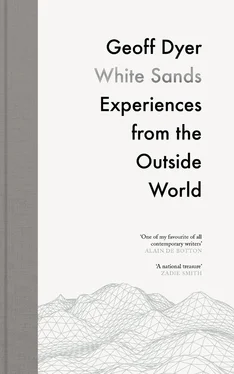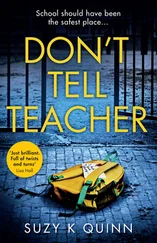A week after the stroke we bought a car, a Prius that had belonged to a friend who had recently died. Almost exactly a year earlier we’d had dinner with her husband while he was in London. When he got back to L.A. his wife (who, until a few weeks previously, when she’d started to feel tired all the time, was much fitter and more energetic than him) was diagnosed with cancer. We saw them both when we visited in May; she seemed to be doing well with chemo — and then, in October, she died. Another friend, in London, had died last spring after years of cancer treatment, remission and recurrence. They were both in their forties. My parents, by contrast, had lived very long lives. My dad soldiered on till his ninetieth birthday — to the day, exactly — in spite of a diet dedicated solely to increasing the chances of a stroke, cancer or heart attack. It’s a shame that he wasn’t around to enjoy the exquisite comedy of his healthy-eating son having a stroke at fifty-five.
In almost every respect life continued unchanged, except that I had to cut out the twice-baked hazelnut croissants and I was often unable to play tennis because of pulled muscles, which took ages to heal — a side-effect of Lipitor or a main-effect of middle age? I didn’t know, but, in keeping with the advice in the brochure, I was getting plenty of other exercise, was constantly out on my bike, in the amazing light and weather. How long would you need to live here to start taking that for granted? Longer, if you’re from England, than one lifetime, even one as lengthy as my dad’s.
I was ready to write off the stroke as an inexplicable happening — and so was the neurologist — a new one — whom I went to see three months later, by which time my cholesterol was down to exactly where it was supposed to be. But doctors don’t like mysteries, are reluctant to surrender to the inexplicable, and he proposed referring me up to another level of expertise: still another neurologist, who specialised in strokes. What did I think of that? Well, shortly after I’d started playing Ping-Pong again I’d mentioned to a friend whose father had suffered a series of strokes that I still had what I guessed was about a 2-percent vision loss on my left-hand side.
‘You want that two percent back,’ he said.
‘I’m English,’ I said. ‘Ninety-eight percent of anything always sounds good to me.’ So my impulse was to say the same thing to the doctor: Forget it, let’s not bother advancing to this new tier of specialism. Especially as this neurologist was based in Hollywood. I’d regained my equilibrium to the extent that my default reaction to many things — like having to schlep over to Hollywood for a hospital appointment — was ‘What a bore!’ But I made the appointment and schlepped over there to see this new brain guy. His name was Sanjay. He looked incredibly young to be in such a senior position, but he managed to trip me up with some simple tests. With my right hand I could run my thumb from little finger to index finger without effort or thought. The first time I tried it with my left hand I made a mess of it, couldn’t get the sequence right. And the second and the third. We then went through an extended series of question-and-answer tests and looked at some of the images of my brain, including the come shot, where you could see quite clearly the explosion or blob of blood of whatever it was, the thing that could have been so much worse than it was. But the finger-and-thumb routine still concerned him, and so, in the coming weeks, I schlepped back for tests that would use million-dollar gizmos to discover why I’d failed this simplest of exercises. Sanjay seemed excited by the case — but it was unclear whether this was simply for the intellectual challenges it presented rather than for my well-being. Even if the outcome of these tests changed his assessment of the cause of the stroke, would it make any difference to the treatment? I asked. Good question, he said. It might well do, depending on the outcome of those tests.
So we kept at it, chasing the source of the problem, smoking it out as if it were Bin Laden in the Tora Bora caves. At one point it seemed that there might be an abnormality in my lungs, so I went back for a test on the lungs. If that proved positive, surgery might be necessary. But that test was negative. The trail went dead. And so, in the end, like the two neurologists before him, Sanjay called it a day, resigned himself to an intellectually frustrating verdict — shit happens, even in the brain — and I continued taking Lipitor and low-dosage aspirin.
In the immediate aftermath of the stroke, I’d often thought of the line in Tarkovsky’s film Solaris: we never know when we’re going to die, and because of that we are, at any given moment, immortal. Even now, many months later, with all of those tests behind me, with my sense of the unavoidable tedium of life fully restored, when the resolution to treat each day as a gift has been largely forgotten, it still feels good, being where I’ve always longed to be, perched on what Adorno called ‘this remote western coast.’ There’s a wild sunset brewing up over the Pacific. The water is glowing turquoise, the sky is turning crazy pink, the lights of the Santa Monica Ferris wheel are starting to pulse and spin in the twilight. Life is so interesting I’d like to stick around forever, just to see what happens, how it all turns out.
In Luxor there is a sculpture, slightly larger than life-size, of a prim king and queen sitting with her right hand on his left shoulder. He is complete, facing straight ahead, but by some accident of time half of her chest and all of her head and left arm have been sheared off at an angle. The damage is severe, the loss irreparable, tragic .
Looked at from a different angle, from the husband’s right, it seems as though her left hand (which in fact is entirely absent) is on his shoulder. Imagine a couple sitting for a formal photographic portrait — a photograph in ancient stone. In the instant when the shutter clicks she dips her head behind his back, giggling at the ridiculous rigidity of the pose they have been asked to adopt. Suddenly they are made whole again .
I assumed this effect was a transitory delusion on my part, but every time I shifted position the woman moved accordingly, reconfiguring herself and re-creating the illusion. The statue has been like this for thousands of years, but its delicacy is such that the fleetingness of a moment — a movement — has been preserved in stone. The ravages of time are caught — and reversed — in an instant. Time is alive, permanently .

6 Matisse: Quoted in David Sweetman, Paul Gauguin: A Life (New York: Simon & Schuster, 1995), p. 554.
9 ‘notorious among all’: Kirk Varnedoe, ‘Gauguin,’ in William Rubin, ed., ‘Primitivsm’ in 20th Century Art , vol. 1 (New York: Museum of Modern Art, 1984), p. 189.
13 ‘a bit snivelling’: D. H. Lawrence, The Letters of D. H. Lawrence , vol. 3, ed. James T. Boulton and Andrew Robertson (Cambridge: Cambridge University Press, 1984), p. 566.
14 Pissarro’s bitchy remark: Quoted in Varnedoe, ‘Gauguin,’ p. 186.
15 ‘I am down’: Ibid., p. 179.
17 ‘something indescribably solemn’: In Herschel B. Chipp, ed., Theories of Modern Art (Berkeley: University of California Press, 1968), p. 75.
19 ‘dry bread’: Quoted in John Berger, Permanent Red (London: Writers and Readers, 1979), p. 202.
76 ‘the invisible is real’: All quotations from De Maria are from ‘The Lightning Field: Some Facts, Notes, Data, Information, Statistics, and Statements,’ originally published in Artforum , April 1980, p. 57, reprinted in Jeffrey Kastner, ed., Land and Environmental Art (London: Phaidon, 1998), pp. 232–33.
Читать дальше













